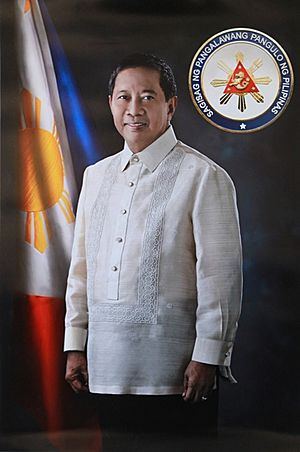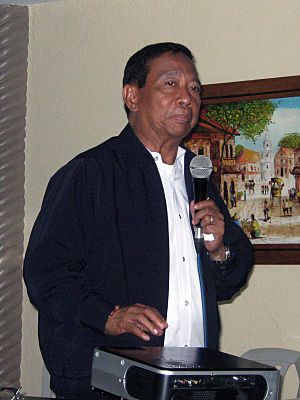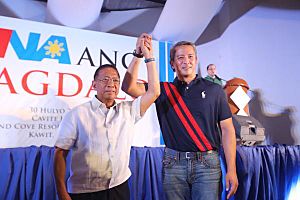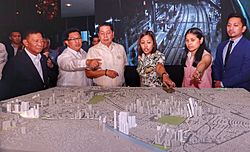Jejomar Binay facts for kids
Quick facts for kids
Jejomar Binay
|
|
|---|---|

Official portrait, 2011
|
|
| 13th Vice President of the Philippines | |
| In office June 30, 2010 – June 30, 2016 |
|
| President | Benigno Aquino III |
| Preceded by | Noli de Castro |
| Succeeded by | Leni Robredo |
| 20th Mayor of Makati | |
| In office June 30, 2001 – June 30, 2010 |
|
| Vice Mayor | Ernesto Mercado |
| Preceded by | Elenita Binay |
| Succeeded by | Jejomar Binay Jr. |
| In office February 2, 1988 – June 30, 1998 |
|
| Vice Mayor | Conchitina Sevilla-Bernardo (1988–89) Augusto Pangan (1989–92) Arturo Yabut (1992–98) |
| Preceded by | Sergio Santos (Acting) |
| Succeeded by | Elenita Binay |
|
Officer-In-Charge
|
|
| In office February 27, 1986 – December 31, 1987 |
|
| Vice Mayor | Roberto Brillante |
| Preceded by | Nemesio Yabut |
| Succeeded by | Sergio Santos (Acting) |
| Chairman of the Metropolitan Manila Development Authority | |
| In office June 30, 1998 – January 20, 2001 |
|
| President | Joseph Estrada |
| Preceded by | Prospero Oreta |
| Succeeded by | Benjamin Abalos |
| In office January 9, 1990 – June 30, 1991 |
|
| President | Corazon Aquino |
| Preceded by | Office created |
| Succeeded by | Ignacio Bunye |
| Governor of Metro Manila | |
| In office December 31, 1987 – February 2, 1988 |
|
| Preceded by | Joey Lina (Acting) |
| Succeeded by | Elfren Cruz (Acting) |
| 3rd Chairman of Housing and Urban Development Coordinating Council | |
| In office June 30, 2010 – June 22, 2015 |
|
| President | Benigno Aquino III |
| Preceded by | Noli de Castro |
| Succeeded by | Chito Cruz |
| Presidential Adviser for Overseas Filipino Workers | |
| In office June 30, 2010 – June 22, 2015 |
|
| President | Benigno Aquino III |
| Personal details | |
| Born |
Jesus Jose Cabauatan Binay
November 11, 1942 Paco, Manila, Philippines |
| Political party | UNA (2012–present) |
| Other political affiliations |
PDP–Laban (1983–2014) UNO (2005–2010) Laban (1978–1983) |
| Spouse |
Elenita Sombillo
(m. 1972) |
| Children | 5 (including Nancy, Abigail and Jejomar Jr.) |
| Alma mater | University of the Philippines Diliman (BA, LLB) National Defense College of the Philippines Philippine Christian University (MA) University of the Philippines Open University (Dip) |
Jejomar "Jojo" Cabauatan Binay Sr. (born on November 11, 1942) is a Filipino lawyer and politician. He served as the 13th Vice President of the Philippines from 2010 to 2016 under President Benigno Aquino III.
Before becoming vice president, Binay was famous for being the mayor of Makati for many years. He was also a human rights lawyer during the time of Martial Law in the Philippines. During this period, he gave free legal help to people who were put in jail for their political beliefs.
As vice president, he was also in charge of a council for housing and helped Overseas Filipino Workers. In 2016, he ran for president but did not win. He later ran for a seat in the Senate in 2022 but was not elected.
Contents
Early Life and Schooling
Jejomar Binay was born in Paco, Manila. His name "Jejomar" is a mix of the names Jesus, Joseph, and Mary. His father was a librarian and his mother was a school teacher. After his parents passed away when he was nine, his uncle adopted him.
Binay was a good student. He went to the University of the Philippines Diliman and earned a degree in political science. He then studied law at the same university and became a lawyer in 1968. He also earned several master's degrees from different universities, including the University of Santo Tomas and the Philippine Christian University.
Work as a Lawyer
After becoming a lawyer, Binay chose to focus on human rights law. This was during the time of Martial Law, when the government under President Ferdinand Marcos had special powers. Binay defended people who were arrested for political reasons and did not charge them any money.
He helped start groups of lawyers who worked to protect people's rights. One of these groups was called MABINI, which stood for Movement of Attorneys for Brotherhood, Integrity, and Nationalism. Because of his work, he was also detained for a short time.
Political Career
Mayor of Makati
In 1986, President Corazon Aquino appointed Binay as the mayor of Makati. He was later elected as mayor in 1988 and served for many terms until 2010. During his time as mayor, the town of Makati grew into a major city in 1995.
Binay was known for helping to protect the government from attempts to overthrow it. This earned him the nickname "Rambotito," which means "little Rambo."
Challenges as Mayor
During his time as mayor, Binay had some disagreements with the national government. In 2006, the government tried to suspend him and other city officials from their jobs. They were accused of having "ghost employees," or names on the city's payroll who were not real workers.
Binay said the order was unfair and stayed inside the Makati City Hall to protest. Many people, including former president Corazon Aquino, supported him. The Court of Appeals eventually stopped the suspension.
Later, there were other disagreements about how the city's money was spent and about taxes. Binay and his team said these issues were politically motivated. Despite these challenges, he remained a popular mayor and was re-elected several times.
Vice President of the Philippines
| Vice presidential styles of Jejomar Binay |
|
|---|---|
 |
|
| Reference style | His Excellency, The Honorable |
| Spoken style | Your Excellency |
| Alternative style | Mr. Vice President |
In the 2010 elections, Binay decided to run for vice president. His running mate for president was former president Joseph Estrada. While Estrada did not win, Binay won the election for vice president, defeating his closest rival, Mar Roxas.
As vice president, President Benigno Aquino III appointed him to two important roles. He was the chairman of the Housing and Urban Development Coordinating Council (HUDCC), which works on providing homes for people. He was also the Presidential Adviser for Overseas Filipino Workers (OFWs), where he helped Filipinos working in other countries.
He resigned from these cabinet positions in 2015 because he had different views from President Aquino and other government officials.
2016 Presidential Campaign
Binay ran for president in the 2016 elections. He promised to improve schools, hospitals, and housing. He also wanted to increase the salaries of teachers, police officers, and other government workers.
His platform focused on fighting poverty and creating more jobs. He also suggested changing the country's constitution to help the economy grow faster. However, he lost the election to Rodrigo Duterte.
Life After the Vice Presidency
After his term as vice president, Binay remained active in public life. In 2017, he became the first dean of the College of Law at the University of Makati.
He ran for a seat in Congress in 2019 but was not successful. He has often shared his opinions on important national issues. For example, he has spoken about the need to protect lawyers and has criticized the government's handling of the COVID-19 pandemic.
In 2022, Binay ran for a seat in the Philippine Senate. He was a guest candidate on the slates of several presidential candidates. He received over 13 million votes but finished in 13th place, just missing one of the 12 available seats.
Personal Life
Binay is married to Dr. Elenita Binay, who also served as the mayor of Makati from 1998 to 2001. They have five children: Nancy, Abigail (Abby), Jejomar Jr. (Junjun), Marita Angeline (Anne), and Joanna Marie Blanca.
Three of his children have also entered politics. Nancy is a senator, while Abby is the current mayor of Makati. Junjun also served as mayor of Makati in the past.
Honors and Awards
Throughout his career, Jejomar Binay has received many awards for his public service.
- World Mayor Award (2006) from City Mayors, an organization based in London.
- Bronze Wolf Award (2018), the highest honor from the World Organization of the Scout Movement for his service to Scouting.
- Doctor of Public Administration (honorary degree) from the Polytechnic University of the Philippines (1992).
Images for kids
See also
 In Spanish: Jejomar Binay para niños
In Spanish: Jejomar Binay para niños
 | Toni Morrison |
 | Barack Obama |
 | Martin Luther King Jr. |
 | Ralph Bunche |





